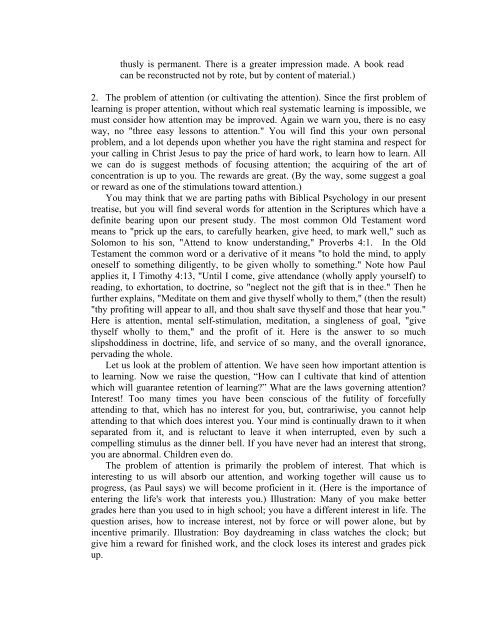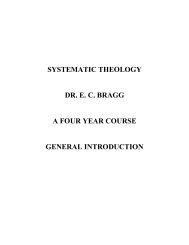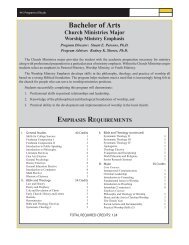CHRISTIAN PSYCHOLOGY DR. E. C. BRAGG - Trinity College
CHRISTIAN PSYCHOLOGY DR. E. C. BRAGG - Trinity College
CHRISTIAN PSYCHOLOGY DR. E. C. BRAGG - Trinity College
You also want an ePaper? Increase the reach of your titles
YUMPU automatically turns print PDFs into web optimized ePapers that Google loves.
thusly is permanent. There is a greater impression made. A book read<br />
can be reconstructed not by rote, but by content of material.)<br />
2. The problem of attention (or cultivating the attention). Since the first problem of<br />
learning is proper attention, without which real systematic learning is impossible, we<br />
must consider how attention may be improved. Again we warn you, there is no easy<br />
way, no "three easy lessons to attention." You will find this your own personal<br />
problem, and a lot depends upon whether you have the right stamina and respect for<br />
your calling in Christ Jesus to pay the price of hard work, to learn how to learn. All<br />
we can do is suggest methods of focusing attention; the acquiring of the art of<br />
concentration is up to you. The rewards are great. (By the way, some suggest a goal<br />
or reward as one of the stimulations toward attention.)<br />
You may think that we are parting paths with Biblical Psychology in our present<br />
treatise, but you will find several words for attention in the Scriptures which have a<br />
definite bearing upon our present study. The most common Old Testament word<br />
means to "prick up the ears, to carefully hearken, give heed, to mark well," such as<br />
Solomon to his son, "Attend to know understanding," Proverbs 4:1. In the Old<br />
Testament the common word or a derivative of it means "to hold the mind, to apply<br />
oneself to something diligently, to be given wholly to something." Note how Paul<br />
applies it, I Timothy 4:13, "Until I come, give attendance (wholly apply yourself) to<br />
reading, to exhortation, to doctrine, so "neglect not the gift that is in thee." Then he<br />
further explains, "Meditate on them and give thyself wholly to them," (then the result)<br />
"thy profiting will appear to all, and thou shalt save thyself and those that hear you."<br />
Here is attention, mental self-stimulation, meditation, a singleness of goal, "give<br />
thyself wholly to them," and the profit of it. Here is the answer to so much<br />
slipshoddiness in doctrine, life, and service of so many, and the overall ignorance,<br />
pervading the whole.<br />
Let us look at the problem of attention. We have seen how important attention is<br />
to learning. Now we raise the question, “How can I cultivate that kind of attention<br />
which will guarantee retention of learning?” What are the laws governing attention?<br />
Interest! Too many times you have been conscious of the futility of forcefully<br />
attending to that, which has no interest for you, but, contrariwise, you cannot help<br />
attending to that which does interest you. Your mind is continually drawn to it when<br />
separated from it, and is reluctant to leave it when interrupted, even by such a<br />
compelling stimulus as the dinner bell. If you have never had an interest that strong,<br />
you are abnormal. Children even do.<br />
The problem of attention is primarily the problem of interest. That which is<br />
interesting to us will absorb our attention, and working together will cause us to<br />
progress, (as Paul says) we will become proficient in it. (Here is the importance of<br />
entering the life's work that interests you.) Illustration: Many of you make better<br />
grades here than you used to in high school; you have a different interest in life. The<br />
question arises, how to increase interest, not by force or will power alone, but by<br />
incentive primarily. Illustration: Boy daydreaming in class watches the clock; but<br />
give him a reward for finished work, and the clock loses its interest and grades pick<br />
up.

















